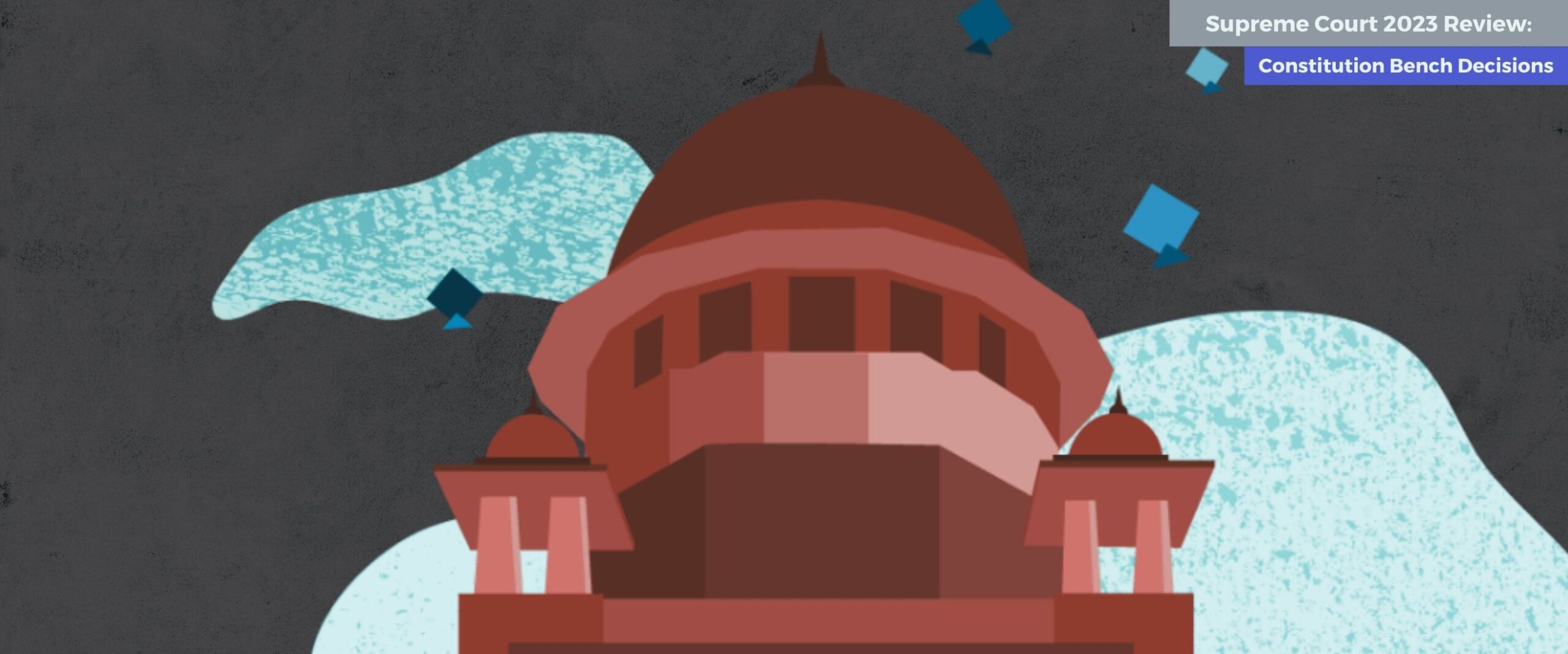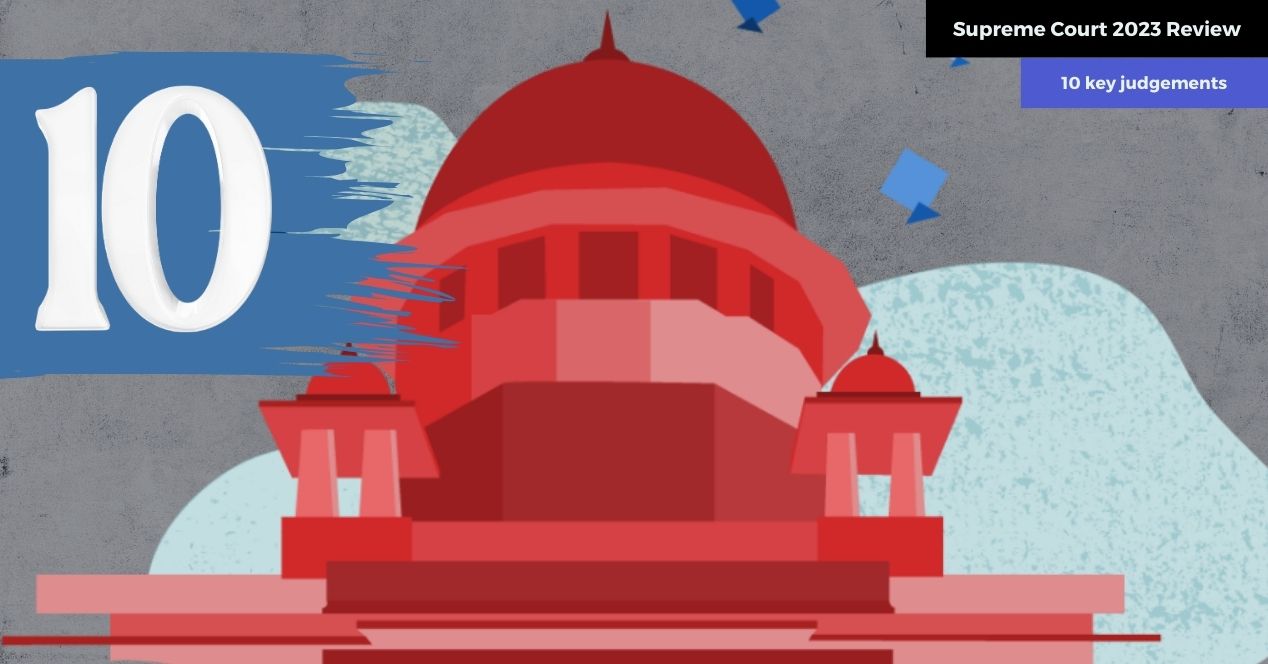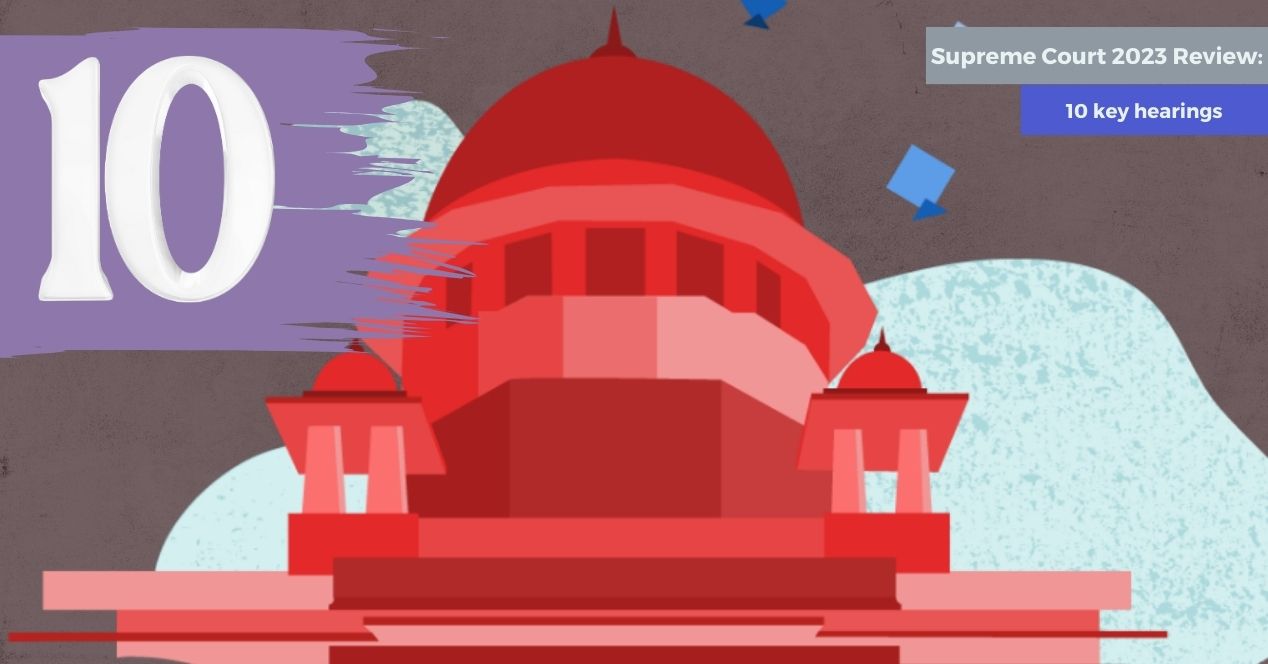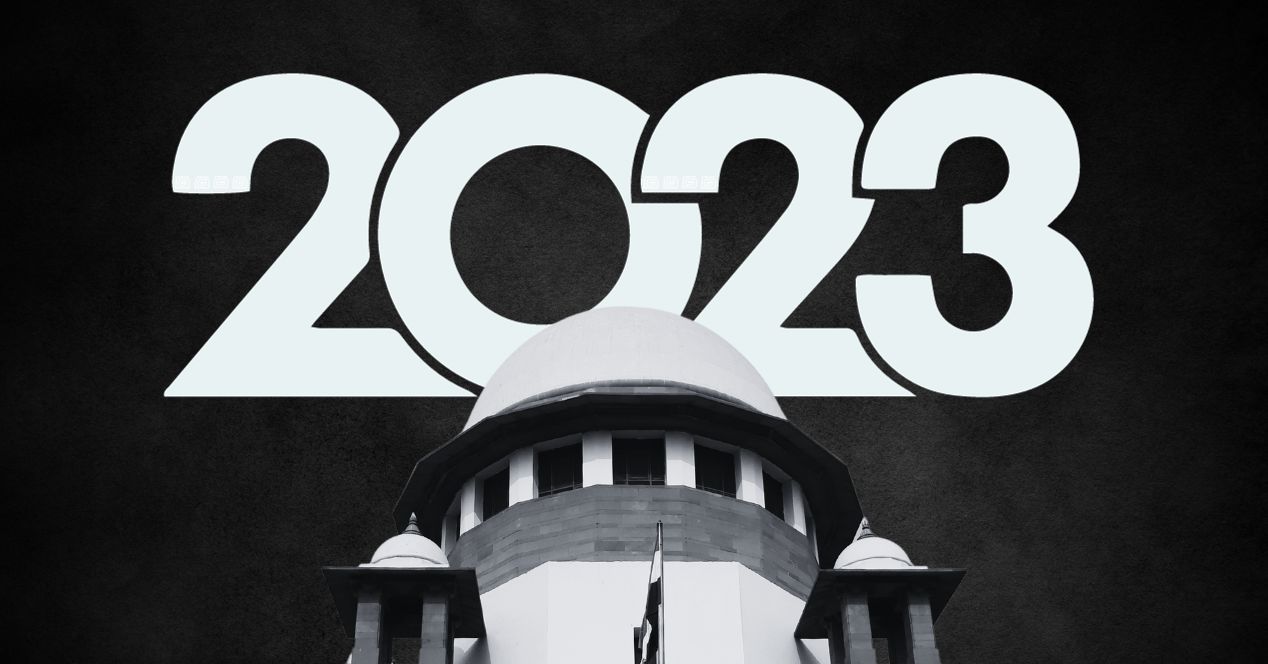Analysis
Supreme Court Review 2023: Constitution Bench Decisions
The Supreme Court delivered 18 Constitution Bench decisions in 2023. SCO lists them all

Passive euthanasia, arbitration, marriage equality, Article 370 and more! After a long break, the Supreme Court was abuzz with Constitution Bench activity in 2023—at least one bench was sitting throughout the year. 18 judgements were delivered on an array of legal issues in 17 cases. For comparison, the top court delivered only four judgements in 2022 and three in 2021.
The year also stands out for another reason. One case, concerning the validity of an unstamped arbitration agreement marked the return of seven-judge bench activity after a hiatus of five years. This case also saw two decisions in a span of nine months.
Notably, in cases, subsequent Union Bills nullified the Court’s decisions. One concerned the appointment of Election Commissioners and the second dealt with the power tussle over ‘services’ between the Union and the state government in the NCT of Delhi. Both received presidential assent.
In some other cases like the challenge to the practice of Jallikattu, and the applicability of the group of companies doctrine in arbitration matters, the Court overruled its previous decisions.
Challenge to Union’s 2016 Demonetisation Scheme
Vivek Narayan Sharma v Union of India
Bench: Justices Abdul Nazeer,B.R. Gavai, A.S. Bopanna, V. Ramasubramanian and B.V. Nagarathna
At the start of the year, right before Justice Abdul Nazeer’s retirement, decisions were delivered in two cases in which he led the Constitution Bench. On 2 January 2023, the Court upheld the Union Government’s demonetisation exercise of 2016 in a 4:1 majority. The majority held that the Reserve Bank of India Act, 1934 (RBI Act) allows the Union Government to declare all series of banknotes as invalid tender.
The Union had submitted that the exercise was conducted to eliminate fake currency, black money and terror financing. The majority concluded that the exercise was proportionate to the objectives sought to be achieved by the policy.
In her dissenting judgement, Justice B.V. Nagarathna held that a demonetisation exercise could not be initiated through an executive notification by the Union Government.
Restrictions on Freedom of Speech
Kaushal Kishore v State Of Uttar Pradesh
Bench: Justices Abdul Nazeer,B.R. Gavai, A.S. Bopanna, V. Ramasubramanian and B.V. Nagarathna
On 3 January 2023, the Supreme Court held that grounds to restrict speech under Article 19(2) are limited. The Bench also held that one cannot invoke other fundamental rights or impose additional restrictions on free speech other than those listed in Article 19(2).
Regarding whether a statement made by a minister can be vicariously attributed to the government, the Court stated that ‘collective responsibility’ does not extend to every statement made by a minister, especially when it is outside the Houses or State assemblies.
Is the State obligated to protect fundamental rights if they are under threat by non-state actors or private individuals? The Bench answered in the affirmative.
Euthanasia and the Right to Die with Dignity
Common Cause v Union of India
Bench: Justices K.M. Joseph, Ajay Rastogi, Aniruddha Bose, Hrishikesh Roy and C.T. Ravikumar
On January 24, the Supreme Court streamlined the extensive guidelines it had made in 2018 for passive euthanasia.
As per the tweaked guidelines, to execute an ‘Advance Medical Directive’ (AMD), the doctors on ‘Primary’ and ‘Secondary’ medical boards to be constituted to validate an AMD will require only five years of experience rather than the previously required 20 years. The Court also dispensed the requirement of having the AMD countersigned by a Judicial Magistrate First Class.
Impact of decriminalisation of adultery on armed forces rules
Joseph Shine v Union of India
Bench: Justices K.M. Joseph, Ajay Rastogi, Aniruddha Bose, Sanjiv Khanna, C.T. Ravikumar
In September 2018, the Supreme Court struck down the penal provision that criminalised adultery under Section 497 of the Indian Penal Code. The Court had reasoned that it was an archaic and patriarchal provision. In 2021, the Union Government sought clarity on whether the judgement applied to members of the armed forces.
On 31 January, the Supreme Court clarified that its judgement would not impact disciplinary proceedings against armed forces personnel.
Challenge to All India Bar Exam
Bar Council of India v Bonnie FOI Law College
Bench: Justices S.K. Kaul, Sanjiv Khanna, A.S. Oka, Vikram Nath and J.K. Maheshwari
On 10 February, a Constitution Bench upheld the Bar Council of India’s (BCI) power to conduct the All India Bar Examination (AIBE).
The Bench overruled its decision in V. Sudeer v Bar Council of India (1999) which held that pre-enrollment examination is beyond the competence of BCI. The Advocates Act, 1961, the bench held, gave the BCI wide authority to control the professional standards for lawyers.
Excommunication Of Members From Dawoodi Bohra Community
Central Board Of Dawoodi Bohra Community v State Of Maharashtra
Bench: Justices S.K. Kaul, Sanjiv Khanna, A.S. Oka, Vikram Nath, J.K. Maheshwari
A common practice in the Dawoodi Bohra community is excommunication of members who defy the community leader’s authority.
On 10 February, the Supreme Court referred the validity of excommunicating members to the nine-Judge Bench hearing the Sabarimala Review case. The Bench decided to tag the two matters after noticing that both deal with the right to manage religious affairs.
Previously, in Sardar Syedna Taher Saifuddin Saheb v. State of Bombay (1962), the Court had held that excommunication forms an integral part of the management of the community.
Election Commission appointments
Anoop Baranwal v Union of India
Bench: Justices K.M. Joseph, Ajay Rastogi, Aniruddha Bose, Hrishikesh Roy and C.T. Ravikumar
On 2 March, the Supreme Court concluded that there was a void in law on the appointment of members of the Election Commission of India (ECI), which was solely done by the President.
The Court created a committee comprising the Chief Justice of India, the Prime Minister and the Leader of Opposition which would advise the President on ECI appointments . But this direction was to only hold till the time the Parliament made its law.
In December, the Parliament passed a law replacing the Chief Justice with a Cabinet Minister of the Prime Minister’s choosing.
Additional compensation for Bhopal Gas Tragedy victims
Union of India v Union Carbide
Bench: Justices S.K. Kaul, Sanjiv Khanna, A.S. Oka, Vikram Nath and J.K. Maheshwari
On 14 March, the Supreme Court rejected the Union’s curative petition seeking additional compensation for the victims of the 1984 Bhopal Gas Tragedy. The Union had sought an additional amount over the settlement amount arrived at with Union Carbide in 1989.
The Court rejected the Union’s claim of miscalculations of the number of victims, injuries and costs that it said were not contemplated at the time of the settlement.
The Bench held that the original settlement can only be vitiated if “gross miscarriage of justice” in the form of fraud is proved and that the compensation settled upon was sufficient.
Supreme Court’s power to directly grant divorce
Shilpa Sailesh v Varun Sreenivasan
Bench: Justices S.K. Kaul, A.S. Oka, Sanjiv Khanna, Vikram Nath and J.K. Maheshwari
On 1 May, the Supreme Court authoritatively clarified that it has power under Article 142 to dissolve a marriage.
The Court held that it is not bound by the procedural requirement of filing a motion for dissolution six months after the original petition for divorce by mutual consent is filed.
Maharashtra political crisis
Subhash Desai v Principal Secretary, Governor of Maharashtra and Ors
Bench: CJI D.Y. Chandrachud and Justices M.R. Shah, Krishna Murari, Hima Kohli and P.S. Narasimha
On 11 May 2023, the Court held that the Maharashtra Governor’s June 2022 decision to order a floor test was illegal. They reasoned that the Governor had proceeded without any objective material to doubt the confidence of the Uddhav Thackeray-led government.
The Supreme Court referred the question of whether a Speaker can decide disqualification petitions despite there being a notice to have them removed to a seven-judge Bench.
Close to eight months after the judgements, on 10 January 2024, the Speaker rejected the disqualification petitions filed by both the factions. He also declared the Shinde-led faction as the “real Shiv Sena” as it had the support of the majority of the MLAs.
The Lieutenant Governor and control over the NCT of Delhi
Government of NCT of Delhi v Union of India
Bench: CJI D.Y. Chandrachud and Justices Krishna Murari, M.R. Shah, Hima Kohli and P.S. Narasimha
On the same day as the Maharashtra political crisis judgement, the Supreme Court held that the state government of Delhi (NCTD), and not the Lieutenant Governor (LG) had control over the capital’s civil services. It also held that the Delhi Legislative Assembly has the power to make laws on ‘services’.
However, the judgement was soon undone through a presidential Ordinance. In August, Parliament enacted a law creating the National Capital Service Authority to recommend the appointment, transfer and postings of civil servants to the Lieutenant Governor who shall hold the final say.
Challenge to the practice of Jallikattu
Animal Welfare Board of India v Union of India
Bench: Justices K.M. Joseph, Ajay Rastogi, Aniruddha Bose, Hrishikesh Roy and C.T. Ravikumar
On 18 May the Supreme Court upheld state amendments to the Prevention of Cruelty to Animals Act, 1960 (PCA Act) allowing bull-taming sports such as Jallikattu.
The Court effectively overturned its 2014 decision in Animal Welfare Board of India v A. Nagaraja which held that such sports are violative of the PCA Act’s provision on cruelty.
The Court decided not to venture into the question of cultural rights They reasoned that it was an exercise that cannot be undertaken by the Court.
Lastly, the Court also clarified that fundamental rights for animals did not find a place in Indian jurisprudence.
Retrospective immunity against arrest
C.B.I. v R.R. Kishore
Bench: Justices S.K. Kaul, Sanjiv Khanna, A.S. Oka, Vikram Nath and J.K. Maheshwari
Section 6A of the Delhi Special Police Establishment Act, 1946 (DSPE Act) mandated the Union Government’s approval for conducting inquiry and investigating officers at the Joint Secretary rank. The Bench held that the provision did not constitute an offence by itself. It merely prescribed the procedure. In Dr. Subramanian Swamy v Director, Central Bureau of Investigation and Anr (2014), the Court had struck down Section 6A DSPE Act.
The question in the case was whether the petitioner, a former Chief District Medical Officer, could still claim immunity under the invalidated provision since he was arrested before the judgement in Dr. Subramanian Swamy.
On 11 September, the Supreme Court clarified that once it declares a law to be unconstitutional under Article 13, it is considered void ab initio or void from its enactment. In other words, it would have a retrospective effect.
Plea for marriage equality
Supriyo @ Supriya Chakraborty v Union of India
Bench: CJI D.Y. Chandrachud and Justices S.K. Kaul, S.R. Bhat, Hima Kohli and P.S. Narasimha
On 17 October, the Supreme Court rejected a batch of petitions seeking the right to marry for sexual minorities, reasoning that there is no implied right to marry under the Indian Constitution. They also reasoned that expanding the institution of marriage to non-heterosexual couples was a matter for Parliament, and not the Court.
The Court refused to declare portions of the Special Marriage Act, 1954 unconstitutional reasoning that this would deny interfaith and inter-caste couples a legal route to get married. The Court also refused to make the Act applicable to non-heterosexual couples as that would have led to reading in words that the legislature did not originally intend to have.
“Group of Companies Doctrine” in arbitration proceedings
Cox and Kings Ltd. v SAP India Pvt. Ltd.
Bench: Chief Justice D.Y. Chandrachud and Justices Hrishikesh Roy, P.S. Narasimha, J.B. Pardiwala and Manoj Misra
On 6 December, the Supreme Court upheld the validity of the “Group of Companies Doctrine” (GOCD) in Indian arbitration jurisprudence. The Court partially overturned a 2012 decision which held that held that non-signatories could be parties to an arbitration agreement through the phrase ‘claiming through or under’ which appeared in Sections 8 and 45 of the Arbitration Act, 1996.
The Bench held that companies within a group that are not signatories to an arbitration agreement could be bound by mutual consent. It clarified that the lack of signature does not always indicate the lack of consent, especially where a company is part of a larger corporate entity.
Whether a non-signatory should be impleaded in a case was left to be determined by the arbitral tribunal.
Challenge to the abrogation of Article 370
In Re: Article 370 of the Constitution
Bench: CJI D.Y. Chandrachud, Justices S.K. Kaul, Sanjiv Khanna, B.R. Gavai and Surya Kant
On 11 December, the Supreme Court upheld the Union Government’s abrogation of Article 370 which granted a special status of the erstwhile state of Jammu and Kashmir (J&K).
The Court did not delve into the issue of bifurcation of the state into two Union Territories based on the Union’s promise that statehood would be restored to J&K in due time. The Court directed the Election Commission of India to conduct legislative assembly elections by the end of September 2024.
Validity of unstamped arbitration agreement
In Re Interplay Between Arbitration Agreements Under The Arbitration And Conciliation Act 1996 And The Indian Stamp Act 1899
Bench: CJI D.Y. Chandrachud and Justices S.K. Kaul, Sanjiv Khanna, B.R. Gavai, Surya Kant, J.B. Pardiwala and Manoj Misra
This case saw two Constitution Bench decisions in a span of eight months.
On 25 April, 2023, a five-judge bench held that an unstamped arbitration agreement was void ab initio and unenforceable. This decision sparked much criticism from practitioners. They claimed that it created unnecessary delays in the process.
Later on 13 December 2023, a seven-judge bench held that an unstamped or insufficiently stamped arbitration agreement was a curable defect and did not render the agreement void. It was merely inadmissible as evidence.




